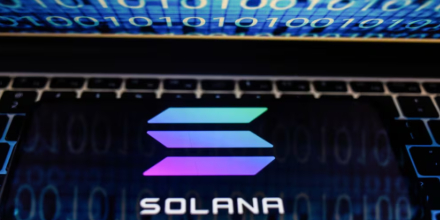P2P.org has joined the Canton Network as a validator, supporting a platform that manages over $4 trillion in tokenized assets. As a validator, P2P.org will run nodes that verify transactions, preserve privacy on permissioned ledgers, and enable institutional-grade tokenization and settlement.
-
P2P.org becomes a validator on Canton — a platform used for $4T+ in tokenized assets
-
P2P.org operates staking infrastructure and reports managing $10B+ across 40+ networks
-
The Canton token model distributes rewards: 35% infrastructure, 50% developers, 15% users
P2P.org validator on Canton Network: Institutional staking update — learn how this move supports $4T tokenization and what it means for institutional DeFi.
What does P2P.org joining the Canton Network mean?
P2P.org joining the Canton Network as a validator signals growing institutional infrastructure support for tokenized real-world assets. The appointment strengthens Canton’s validator set and helps connect staking infrastructure providers with regulated institutions seeking privacy-preserving, compliant tokenization and settlement solutions.
How does the Canton Network reward validators and participants?
The Canton Network issues its native Canton Coin and ties distribution to network contribution. Infrastructure providers receive 35%, application developers 50%, and users 15%. This model emphasizes usage-aligned incentives rather than traditional stake-yield distributions.
P2P.org has joined the $4T Canton Network as a validator, underscoring the rise of institutional blockchain infrastructure.
P2P.org has become a validator on the Canton Network, a blockchain platform for institutional finance that handles more than $4 trillion in tokenized assets. As a validator, P2P.org will operate nodes that verify and record transactions on the network.
Launched in May 2023, Canton is a blockchain platform developed to support regulated institutions, with emphasis on real-world asset (RWA) tokenization, interoperability and adherence to compliance standards.
The move adds P2P.org — a staking infrastructure provider that reports managing over $10 billion in assets across more than 40 blockchain networks — to a growing list of participants in Canton’s ecosystem, including major global banks and financial institutions.
Jonathan Reisman, product manager at P2P.org, told Cointelegraph that many blockchains were not designed with institutional requirements in mind, slowing adoption in traditional finance.
Reisman said solutions such as the Canton Network bring “firms into an ecosystem where tokenization of assets, secure trading, and even innovations like BTC wrapping can be developed in a way that aligns with institutional standards.”
He added, “Validators only process the transactions they’re a party to and maintain them on their own ledger. This makes privacy more straightforward and institution-friendly.”
Related: P2P.org expands staking services with TON integration
How is institutional staking evolving?
On most proof-of-stake blockchains, validators earn rewards for securing the network by staking tokens. Validators lock up or operate delegated assets and receive yields for supporting consensus and transaction finality.
Staking has become a dominant trend this year, with a broader institutional push into networks such as Ethereum and other public chains. Canton’s model differs by aligning native token distribution to usage rather than pure stake-weighted yields.
According to Canton, the design ties rewards to actual activity and engagement on the network. Each application also has flexibility to set its own openness and confidentiality levels.
Like Canton, more protocols are building infrastructure to address institutional demand. In February, Lido launched its v3 upgrade with modular contracts designed to give institutions more control and compliance features. Anchorage Digital also added institutional custody and staking services for Starknet’s STRK token, launching with an initial yield reported at 7.28% APR.
 Liquid staking protocols. Source: DefiLlama
Liquid staking protocols. Source: DefiLlama
Recent regulatory developments in the United States are influencing institutional demand for crypto yield products. The Securities and Exchange Commission (SEC) issued guidance on liquid staking receipt tokens, noting conditions under which such receipt tokens may not be securities.
Industry executives described the SEC guidance as supportive for both DeFi and institutional participation, as it clarifies when liquid staking receipt tokens can be used in DeFi without being treated as securities offerings.
Frequently Asked Questions
How does a Canton validator operate differently from public PoS validators?
Validators on Canton only process transactions to which they are a party and record them on private, permissioned ledgers. This model enhances privacy and compliance for institutional participants while still enabling cross-application interoperability.
Is Canton designed for regulated financial institutions?
Yes. Canton was built with regulated institutions in mind, prioritizing RWA tokenization, compliance tooling, and configurable confidentiality so banks and asset managers can participate within regulatory frameworks.
What does P2P.org’s participation mean for institutional staking?
P2P.org’s role as a validator brings professional staking operations and custody experience to Canton, potentially lowering operational barriers for institutions seeking compliant staking and tokenization services.
Key Takeaways
- P2P.org joins Canton: adds professional validator infrastructure to a $4T+ tokenization platform.
- Canton’s reward model: distributes Canton Coin to infrastructure (35%), developers (50%) and users (15%) to align incentives with engagement.
- Institutional focus: Canton and similar protocols prioritize privacy, compliance, and developer flexibility to accelerate RWA adoption.
Conclusion
This development underlines a broader industry shift toward institutional-grade blockchain infrastructure. P2P.org joining the Canton Network strengthens the ecosystem that supports large-scale RWA tokenization and institutional staking. Expect continued integration between staking providers, custodians, and regulated institutions as networks evolve.




